In today’s digital age, content marketing has become a cornerstone for businesses looking to engage with their audience, build brand awareness, and drive sales. Effective content marketing strategies can differentiate your brand, attract potential customers, and retain existing ones. Here are some top content marketing strategies to consider implementing in your business today.
1. Develop a Comprehensive Content Strategy
Before diving into creating content, it’s essential to develop a comprehensive content strategy. This involves understanding your target audience, setting clear goals, and determining the types of content that will resonate with your audience. A well-defined content strategy ensures that all your content efforts are aligned with your business objectives and provides a roadmap for consistent and purposeful content creation.
2. Leverage SEO for Better Visibility
Search Engine Optimization (SEO) is critical for ensuring that your content is discoverable by your target audience. Effective keyword research can help you identify the terms and phrases that you should insert into your content. Optimize on-page elements such as titles, meta descriptions, and headers to improve your search engine rankings. Additionally, focus on creating high-quality, valuable content that addresses the needs and pain points of your audience, as this can help improve your site’s authority and ranking over time.
3. Create High-Quality, Valuable Content
Quality is paramount when it comes to content marketing. Focus on creating high-quality, valuable content that provides real benefits to your audience. This can include blog posts, articles, infographics, videos, podcasts, and more. Ensure that your content is well-researched, informative, and engaging. High-quality content not only attracts and retains your audience but also encourages social sharing and backlinks, which can further boost your online visibility and authority.
4. Utilize Different Content Formats
Diversify your content by utilizing different formats to cater to the preferences of your audience. Some people prefer reading blog posts, while others might engage more with videos or podcasts. Experiment with various content types such as infographics, eBooks, webinars, and interactive content to see what resonates most with your audience. By offering a variety of content formats, you can reach a broader audience and keep them engaged.
5. Harness the Power of Video
Video content continues to dominate the digital landscape and is an effective way to engage your audience. Consider creating different types of video content such as tutorials, product demos, customer testimonials, and behind-the-scenes footage. Videos can be shared on various platforms, including your website, social media channels, and YouTube, to increase reach and engagement. Additionally, live streaming on platforms like Facebook and Instagram can create real-time interactions with your audience, fostering a sense of community and immediacy.
6. Engage with Your Audience on Social Media
Social media is a powerful tool for distributing your content and engaging with your audience. Share your content across different social media platforms to increase its visibility and reach. Engage with your audience by responding to comments, asking questions, and encouraging discussions. Utilize social media analytics to track the performance of your content and gain insights into what resonates with your audience, allowing you to refine your strategy accordingly.
7. Leverage Influencer Marketing
Influencer marketing can amplify your content marketing efforts by leveraging the reach and credibility of influencers in your industry. Collaborate with influencers to create and share content that promotes your brand. Influencers can help you reach a wider audience, build trust, and drive engagement. When selecting influencers, ensure they align with your brand values and have an engaged and relevant following.
8. Email Marketing: A Direct Line to Your Audience
Email marketing remains one of the most effective ways to nurture leads and maintain relationships with your audience. Use email newsletters to share valuable content, updates, and promotions directly with your subscribers. Personalize your emails to increase engagement and make your audience feel valued. Segment your email list to deliver more targeted content based on your subscribers’ interests and behaviors.
9. Measure and Analyze Your Content Performance
Regularly measuring and analyzing the performance of your content is crucial for understanding what works and what doesn’t. Use tools like Google Analytics, social media analytics, and email marketing software to track key metrics such as traffic, engagement, conversions, and ROI. Analyzing this data will provide insights into your content’s effectiveness and help you make data-driven decisions to improve your content marketing strategy.
10. Continuously Optimize and Iterate
Content marketing is not a set-it-and-forget-it strategy. Continuously optimize your content based on performance data and feedback from your audience. A/B test different headlines, formats, and calls to action to see what performs best. Stay updated with industry trends and be willing to experiment with new ideas and approaches. Continuous optimization ensures that your content remains relevant, engaging, and effective in achieving your business goals.
Conclusion
Implementing these content marketing strategies can significantly enhance your ability to connect with your audience, build your brand, and drive business growth. By developing a comprehensive content strategy, leveraging SEO, creating high-quality content, diversifying content formats, and engaging with your audience, you can create a robust content marketing framework that delivers tangible results. Regularly measure your content’s performance and continuously optimize your efforts to stay ahead in the competitive digital landscape.
.


